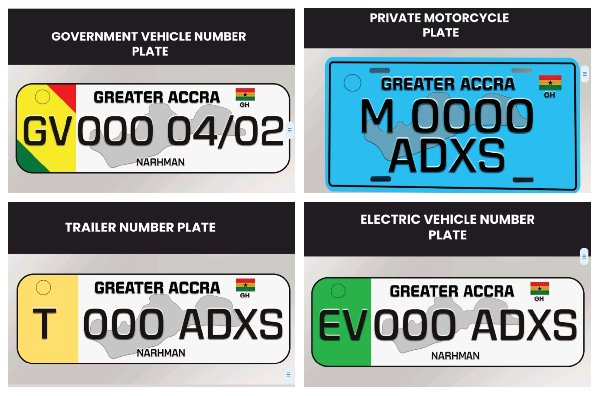Chief Executive Officer of the Driver and Vehicle Licensing Authority, Julius Neequaye Kotey and the technical team outlined the upcoming nationwide vehicle registration reforms, aimed at modernizing the system, enhancing security, and addressing longstanding issues like plate abuse and data inaccuracies.
The session covered historical context, justifications, legal updates, processes, features, and timelines, emphasizing stakeholder input for a collaborative rollout. Below are the key highlights:
Historical Background
- 1960s–1980s: Basic plates with security flaws, leading to inadequate vehicle owner protection.
- 1995–2008: Nationwide re-registration introduced GR (registration center code) + serial number + “S” for year, but ran out of letters (e.g., after Z), causing format constraints.
- 2009–Present: Shifted to last two digits of the year (e.g., “13” for 2013), but led to seasonal registration dips (September–December) as people delayed for “new year” plates, pressuring the system and prioritizing year over vehicle condition.
Justifications for the New System
- Database Cleanup: Builds a credible, updated vehicle registry to tackle stolen/unaccustomed vehicles and fraud (e.g., easy plate duplication from garages).
- State-Controlled Printing: Plates will be produced in-house by DVLA (not private entities) after verification, reducing unauthorized access.
- Owner Identification: Links plates to verified owners to boost public safety, crime prevention (e.g., vehicles in crimes), road enforcement, and regional harmonization (e.g., ECOWAS integration).
- Best Practices: Aligns with global standards for reliable data and anti-fraud measures.
Legal and Preparatory Updates
- Amendments Needed: Section 40 of Act 683; Regulations 10 and 24.4 of LI 2180 (draft approved by Cabinet, now in Parliament).
- New Temporary Plates (TMP): Replaces abused DV plates for unregistered vehicles; valid up to 6 months max, non-transferable, for fleet dealers/individuals only—no private misuse.
- Stakeholder Engagement: Technical committee with developers; ongoing sensitization (e.g., this week’s events) for inclusive implementation.
- Preparation Status: Systems testing by November 15, 2025; pilot in December 2025; full launch January 1, 2026.
Registration Process
- New Registrations (from Jan 1, 2026): Electronic request → appointment → customs/roadworthiness checks → plate affixation and RFID activation (prevents duplicates; alerts on fakes).
- Re-Registrations (Existing Vehicles, from Apr 1, 2026): Appointment-based; requires prior “onboarding” (digitize paper files + add vehicle photo for smart card). If not onboarded, do so now at DVLA centers to ease the process—advisory: complete by April 2026 to avoid delays.
- Expansion: More centers for accessibility; full re-registration deadline: December 31, 2027.
Key Features of the New Plates
- Core Design: Reflective for visibility; background map of registration region (e.g., Greater Accra); Ghana flag + country code (GA); 4-digit base number (e.g., 0958) + center code (e.g., GR → Osu); random security mark (XY for anti-forgery).
- Renewal Sticker: Circular space for bi-annual stickers to track active vehicles (filters out written-off ones from cumulative database).
- Vehicle-Specific Variants:
- Private Cars: White background.
- Commercial: Yellow background.
- Diplomatic: Unique mission codes (security-restricted).
- Motorcycles: Blue (private) or yellow (commercial) for fare-paying regulation.
- Government: High-visibility (replaces hard-to-read green); ministry/agency codes (e.g., 04-02).
- Electric Vehicles: Green EV mark on left.
- Trailers: Yellow with “T” mark; separate from head registration for owner tracking.
- Equipment/Tractors (EQ): Dedicated plates.
- Updated DV/TMP: Dealership code + expiry date; non-transferable with vehicle type and verification QR.
- Customized/Ceremonial: Personalized (e.g., names, events like weddings/divorces); valid 7 days for ceremonial; fees apply.
- Technology: RFID for activation/unique ID; enables scanning for enforcement, tolling, and tracking (no year display to curb vanity delays).

